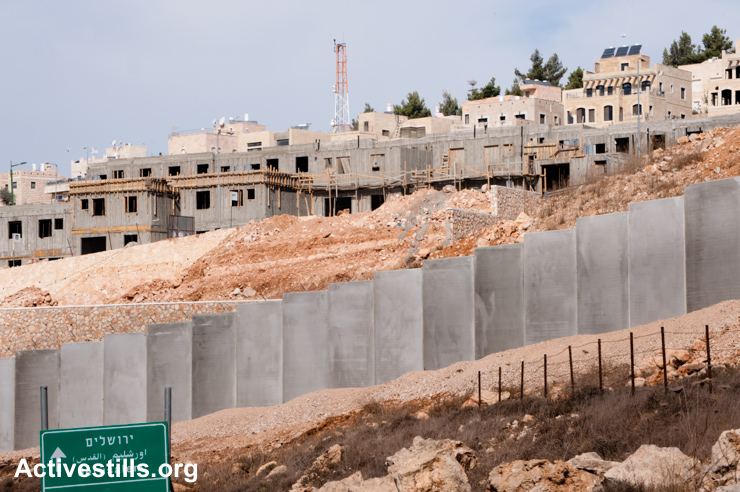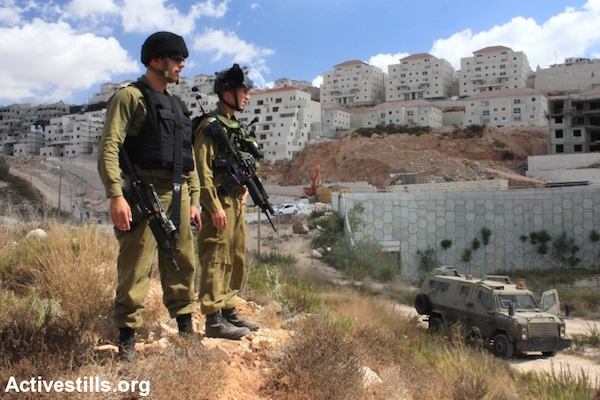Israel’s justice minister announces a plan to apply Israeli law to parts of the West Bank, or in other words, annexation. By taking an incremental approach, she stands a pretty good chance of succeeding. Success, however, will expose the true nature of Israel’s discriminatory regime.

Each time a right-wing Israeli politician introduces a law that would advance the slow-moving process of annexing the West Bank, the usual suspects one expects to be outraged — journalists, foreign diplomats, the Israeli opposition, Palestinian politicians and diplomats — care just a little bit less.
Part of the reason is that the most outrageous laws proposed by right-wing Israeli politicians rarely get very far. The other reason is that for the Palestinian stakeholders, those provocative laws rarely threaten to seriously alter the current situation in ways that most people understand or care about. Or in other words, things are already bad enough that making them worse is pretty challenging.
For instance, a (twice) proposed law aiming to legalize Israeli settlement outposts illegally built on privately owned Palestinian land that all but eliminated the possibility for Palestinians to get their land back, would not have actually changed anything (Hebrew). The law would have been bad, but is the current situation any better? The illegal settlements are still standing, and the Palestinian land owners are still dispossessed of their land.
This week saw yet another such legislative anti-drama, an initiative promoted by Israeli Justice Minister Ayelet Shaked to apply Israeli law to the West Bank, or more specifically, to Israeli settlements and the settlers who live there.

Yes, adding to and further entrenching the laws that Israel has already applied (via military order) to the West Bank and the settlements and settlers there represents movement toward annexation. (Applying one’s civilian law to occupied territory, like Israel did in the Golan Heights, is largely considered to be de facto annexation.) But then again that’s been going on for decades. (More on that later.)
Shaked and other high profile members of her political party make no secret of their intentions to annex the West Bank to Israel — slowly. They recognize that neither mainstream Israel nor the international community is ready to accept sweeping annexation; incremental annexation is a far more effective, and achievable goal.
‘A gradual path — the Zionist way’
The leader of Shaked’s party, Naftali Bennett, whose plan to annex 60 percent of the West Bank helped propel him into power, has on numerous occasions said so quite openly.
“This is a process,” Bennett explained at the Brookings Institute a year and a half ago, just a few weeks after a previous annexation bill died in the Knesset. “I’m not suggesting that, you know, one day in midday we just [annex]. There’s a process of changing the global view of what’s going on here and it has to start with that… And it takes time. It’s an uphill battle.”

At the time, Orit Stuck, the sponsor of a previous, more ambitious annexation bill, openly described how she and other annexationists have prepared a series of 10 draft laws that would annex the West Bank in stages: first individual settlements, then Area C, and eventually, everything west of the Jordan River.
But nobody is ready to stomach full annexation, explained Struck, then a member of Knesset from Bennett and Shaked’s party. “As of now, it is impossible to create such a basis of support for the idea of annexing the entire area including Ramallah, Nablus and more cities,” she added. “That’s why we must continue in what has been the Zionist way, which has always been a gradual path.”
Shaked’s initiative, too, would not comprise one large sweeping application of Israeli law to the West Bank. It is a framework, a working plan for an incremental process that is designed to evoke far less resistance, both domestically and abroad.
It’s harder to fight an incremental process. It’s harder to identify. It’s harder to beat back.
Incremental annexation, which is by no means new, bores the — domestic and international — opposition into inaction. Nobody is going to take Israel to task for applying environmental protection laws to the occupied West Bank. Members of the UN Security Council will not bother with the arduous task of overcoming an American veto just to pass a resolution condemning the application of workers’ rights legislation to Israeli settlements.
When change comes piece by piece, granule by granule, museum budget by museum budget — nobody cares, especially when world leaders are occupied with far more urgent matters. And despite the fact that everybody knows exactly what all those small changes will eventually add up to (half a million Israelis didn’t move into the occupied territories overnight), seemingly inconsequential and incremental changes rarely seem worthy of the effort required to defeat them. Then, before you know it, it’s too late. Facts on the ground.
Separate and unequal

But the incremental game is not new. It is not an invention of Ayelet Shaked, Naftali Bennett, or even Benjamin Netanyahu. The piece-by-piece approach to seizing and acquiring control of land has been a hallmark of the Zionist project in Israel since long before the existence of the state itself. In fact, the incremental application of Israeli law to the West Bank — or more specifically, to Israeli settlers and settlements in the West Bank — has been going on for decades. The only thing Shaked’s proposal will accomplish is to streamline the process going forward.
Furthermore, there already exists an apartheid-esque system of separate and unequal dual legal systems for Jewish settlers and Palestinians. A Jew and a Palestinian standing right next to each other, driving right next to each other, shopping side by side, are subject to different legal systems. If they both shoplift the same item from the same West Bank store they will be brought to different courts — the Jew to a civilian court inside Israel and the Palestinian to a military court in the West Bank. If they are convicted, they would be sentenced under different guidelines and sent to different prisons.
A Jew living in — or even just visiting — the West Bank has the right to free movement. For the most part he or she can travel almost completely unhindered; Palestinian residents of the West Bank are subject to military closures, they are dependent on travel and work permits, and they cannot ride on certain roads and even buses reserved for Israelis. A Jew in the West Bank is allowed to engage in political protest; a Palestinian has no such right. A Jew in the West Bank, regardless of whether they are an Israeli citizen, can marry an Israeli and move to Israel to live with them; a Palestinian resident of the West Bank who marries an Israeli citizen cannot.

A Jew living in the West Bank has democratic avenues for influencing the policies that affect his or her daily life – he or she can vote for elected representatives, who in this case give orders to the Israeli military government that governs the occupied territory; he or she can influence whether or not the territory in which they live is annexed. A Jew living in the West Bank lives in a democracy. A Palestinian living on the exact same parcel of land lives under a fundamentally undemocratic military regime that is in no way unaccountable to its subjects.
The justice minister’s plan to streamline the application of Israeli laws to the West Bank will not change any of that. It will not create equality nor will it create an apartheid regime, for the latter already exists.
The Israeli right wing doesn’t really care about annexing the West Bank; annexation is merely a tool — a tactic. Its bottom-line is to make the country’s grip on the West Bank irreversible. But annexation is a tricky thing. There will eventually come a tipping point when all of the smaller pieces, the granules of incremental annexation, come into focus — when it becomes impossible not to see the bigger picture, the sum of everything that has taken place.
When that happens, when it becomes indisputable that Israel has no intention of either ceding control of Palestine or giving equal rights and citizenship to the millions of Palestinians who live there, there will only be one way of describing the regime ruling over the entire land from the river to the sea — apartheid.

